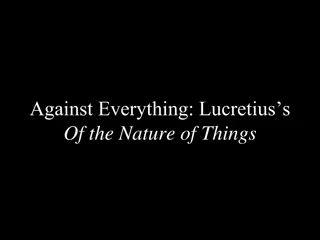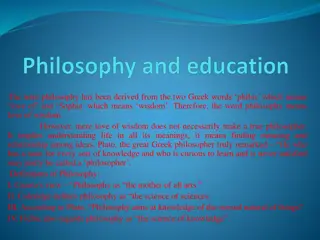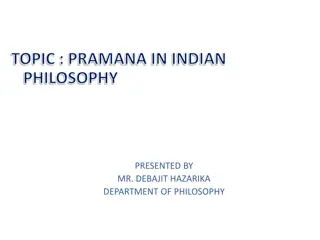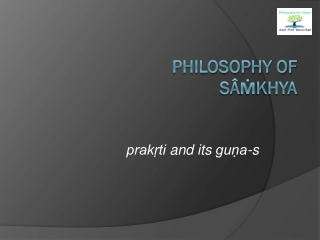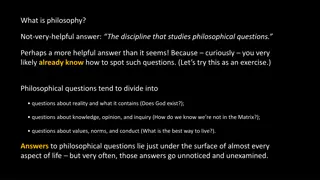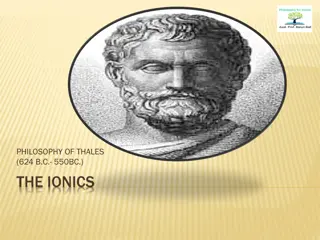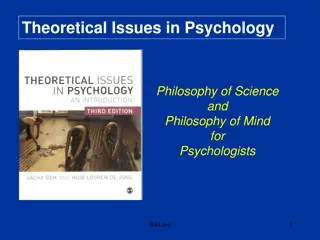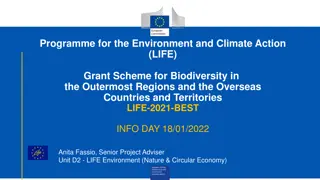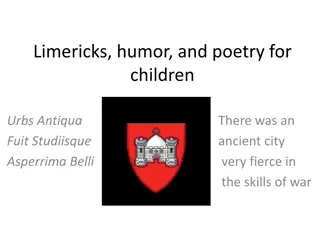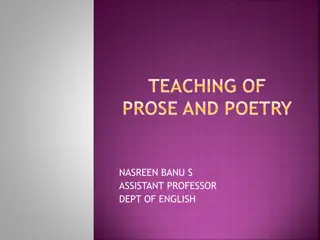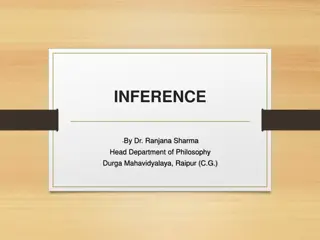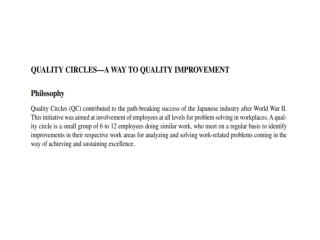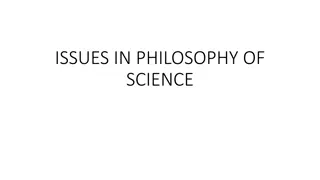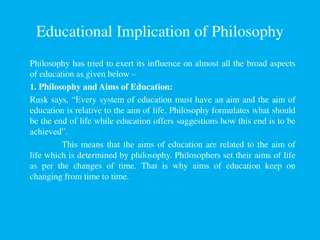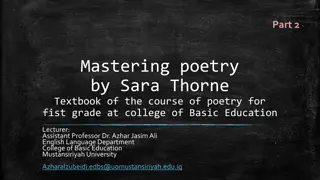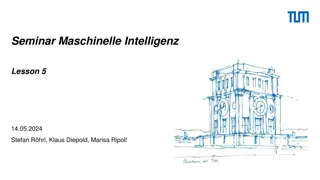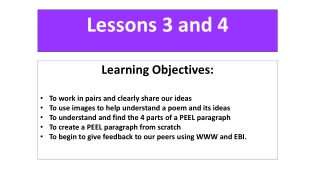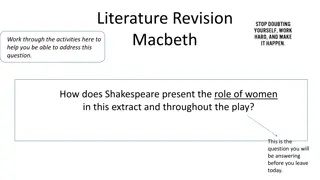Exploring Lucretius and De Rerum Natura: Philosophy, Poetry, and Materialism
Delve into the life and works of Roman philosopher and poet Lucretius, particularly his masterpiece "De Rerum Natura." Discover the blend of philosophy and poetry, the essence of atomistic materialism, and the themes of explanation, free will, and mortality explored in his writings.
Download Presentation
Please find below an Image/Link to download the presentation.
The content on the website is provided AS IS for your information and personal use only. It may not be sold, licensed, or shared on other websites without obtaining consent from the author. Download presentation by click this link. If you encounter any issues during the download, it is possible that the publisher has removed the file from their server.
Presentation Transcript
Lucretius, De Rerum Natura. Part One: The Adventures of Philosophy
(I) Introduction to Lucretius and De Rerum Natura (II) Epicurus and Lucretius, Philosophy and Poetry (III) Philosophy and Epic (IV) What is Atomistic Materialism?
(I) Introduction: Lucretius and De Rerum Natura
Lucretius: Roman philosopher and poet; born 94 BCE (?), died 54 or 51 BCE; De Rerum Natura( On the Nature of Things ): long philosophical poem addressed to the Roman aristocrat Memmius; unfinished, not published until after Lucretius s death;
The poetry of Lucretius is, as you say in your letter, rich in brilliant genius, yet highly artistic. Cicero, letter to his brother Quintus, 54 BCE
The poet Lucretius was born. He was driven mad by a love potion and, having composed in the intervals of his insanity several books which Cicero afterwards corrected, committed suicide in his forty-fourth year. St. Jerome, late 4th century
Happy he who was able to know the causes of things, and who trampled beneath his feet all fears, inexorable fate, and the roar of devouring hell. Virgil, Georgics, 2.490-2, 29 BCE
Happy he who was able to (1) know the causes of things, and who (2) trampled beneath his feet all fears, inexorable (3) fate, and the roar of devouring (4) hell. The four dominant themes of DRN: (1) the explanation of everything (2) invalidation of irrational beliefs and fears, including the fear of death (3) vindication of free will (4) proof of the mortality of the soul
The structure of DRN: (1) The constituents of the universe: matter (atoms) and void (2) How atoms explain phenomena (3) The nature and mortality of the soul (4) Phenomena of the soul (5) The cosmos and its mortality (6) Cosmic phenomena
(II) Epicurus and Lucretius, Philosophy and Poetry. Or, the Poet as Honey Bee
I follow you, glory of the Greek race, as in your footprints I now plant my own, not so much out of any desire to compete with you as for love, for my wish is to imitate you You are our father, the discoverer of reality. You pass to us your paternal precepts, and from your scrolls, glorious one, just as bees sip all they can find in the flowery glades, we likewise feed upon all of your golden words golden, and ever deserving of perpetual life. DRN, 3.3 13
I am fully sensible of the obscurity of my subject; but a high hope of glory has struck my heart sharply with its inspiring thyrsus, and at the same time has injected into my breast sweet love of the Muses; this is what impels me now to penetrate by power of intellect the remote regions of the Pierian maids, hitherto untrodden by any foot. Joyfully I visit virgin springs and draw their water, joyfully I cull unfamiliar flowers, gathering for my head a chaplet of fame from spots where the Muses have never before taken a garland for the brows of any person: first because I teach about important matters and endeavor to disentangle the mind from the strangling knots of superstition, and also because on an obscure subject I compose such luminous verses, overspreading all with the charm of the Muses. DRN, 1.921-935
For obviously my actual technique does not lack a motive. Doctors who try to give children foul-tasting wormwood first coat the rim of the cup with sweet juice of golden honey; their intention is that the children, unwary of their tender age, will be tricked into applying their lips to the cup and at the same time will drain the bitter draught of wormwood victims of beguilement, but not of betrayal, since by this means they recover strength and health. DRN, 1.935-943
Just as children tremble and fear everything in blinding darkness, so we even in daylight sometimes dread things that are no more terrible than the imaginary dangers that cause children to quake in the dark. This terrifying darknessthat enshrouds the mind must be dispellednot by the sun s rays and the dazzling darts of the day, but by the study ofthe superficial aspect and underlying principle of nature. DRN, 1.55-60
Mother of Aeneas people, delight of human beings and the gods, Venus, power of life, it is youwho beneath the sky s sliding stars inspirit the ship-bearing sea, inspirit the productive land. To you every kind of living creature owes its conception and first glimpse of the sun s light. You, goddess, at your coming hush the winds and scatter the clouds; for you the creative earth thrusts up fragrant flowers; for you the smooth stretches of the ocean smile, and the sky, tranquil now, is flooded with effulgent light.
Once the door to spring is flung open and Favonius fertilizing breeze, released from imprisonment, is active, first, goddess, the birds of the air, pierced to the heart with your powerful shafts, signal your entry. Next wild creatures and cattle bound over rich pastures and swim rushing rivers: so surely are they all captivated by your charm and eagerly follow your lead. Then you inject seductive love into the heart of every creature that lives in the seas and mountains and river torrents and bird-haunted thickets and verdant plains, implanting in it the passionate urge to reproduce its kind.
Sinceyou and you alone stand at the helm of nature s ship, and since without your sanction nothing springs up into the shining shores of light, nothing blossoms into mature loveliness, it is you whom I desire to be my associate in writing this poemOn the Nature of Things, which I am attempting to compose for my friend Memmius. DRN, 1.1-25
When all could see that human life lay groveling ignominiously in the dust, crushed beneath the grinding weight of superstition, which from the celestial regions displayed its face, lowering over mortals with hideous scowl, the first who dared to lift mortal eyes to challenge it, the first who ventured to confront it boldly, was a Greek. This man neither the reputation of the gods nor thunderbolts nor heaven s menacing rumbles could daunt; rather all the more they roused the ardor of his courage and made him long to be the first to burst the bolts and bars of nature s gates.
And so his minds might and vigor prevailed, and on he marched far beyond the blazing battlements of the world, in thought and understanding journeying all through the measureless universe; and from this expedition he returns to us in triumph with his spoils: knowledge of what can arise and what cannot, and again by what law each thing has its scope restricted and its deeply implanted boundary stone. So now the situation is reversed: superstition is flung down and trampled underfoot; we are raised to heaven by victory. DRN, 1.61-79
Poor girl!() For uplifted by masculine hands, she was led, trembling with terror, to the altars. Instead of being escorted by the wedding hymn s cheerful ring, when the solemn service of sacrifice had been performed, she was to be immolated by her father and fall a sorrowful and sinless victim of a sinful crime, cheated of the marriage for which she was just ready. And all to what purpose? To enable a fleet to receive the blessing of a prosperous and propitious departure? Such heinous acts could superstition prompt. DRN, 1.93-102




